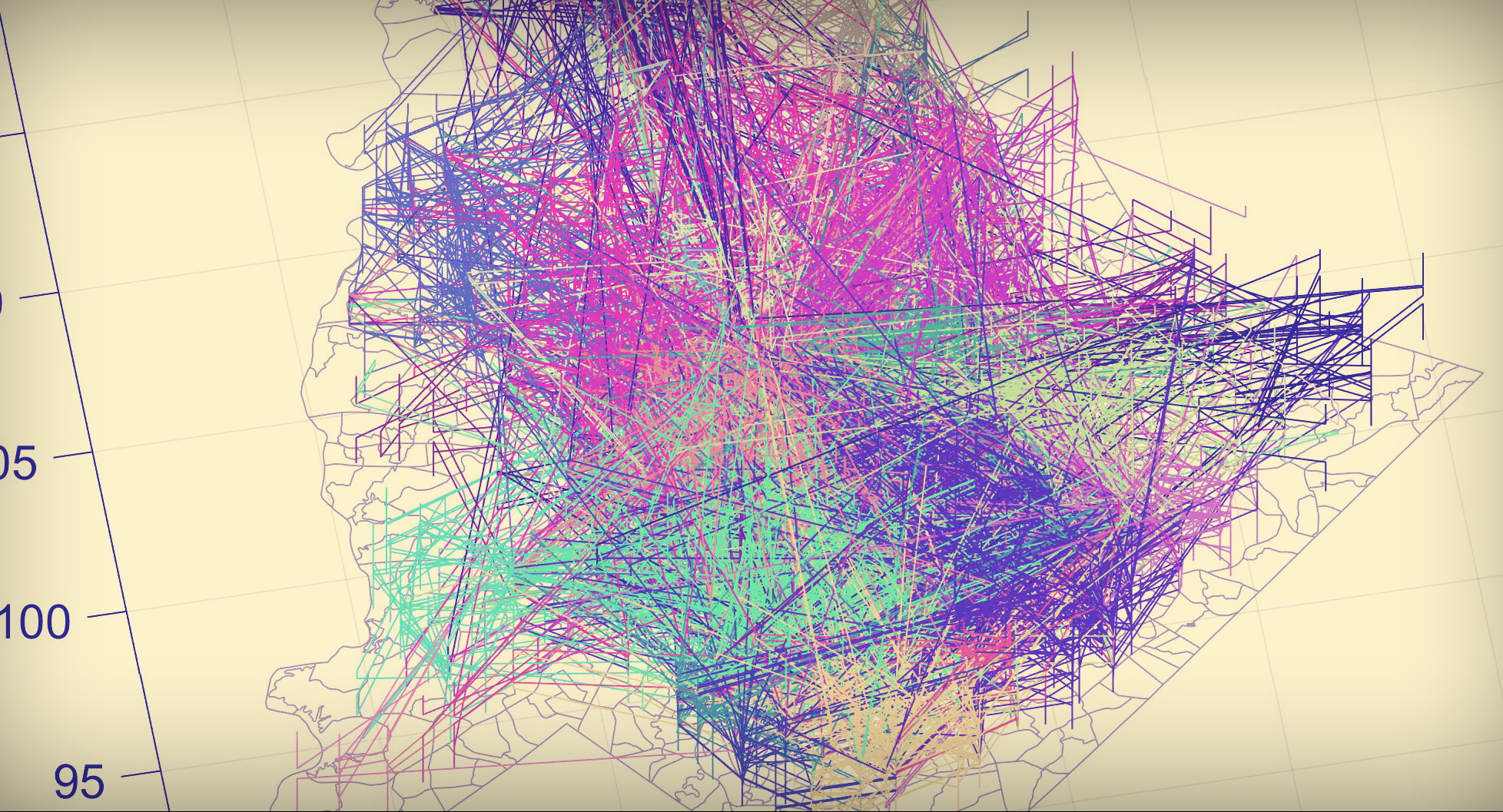Wenjia Zhang, Ph.D. | Assistant Professor
Email: wenjiazhang@pku.edu.cn or zhangwj@pkusz.edu.cn
Education
2015 Ph.D. in Community and Regional Planning, University of Texas at Austin, U.S.
2010 M.S. in Human Geography, Peking University, Beijing, China
2007 B.S. in Geography, Nanjing University, Nanjing, China
Research Experience
2017- Doctoral Supervisor (Professor Fellow), Peking University
2017- Assistant Professor, School of Urban Planning and Design, Peking University Shenzhen Graduate School
2015-2017 Postdoc Research Fellow, Department of Geography and Earth Sciences, University of North Carolina at Charlotte
2010-2015 Research Assistant, Community and Regional Planning, University of Texas at Austin
2008 Research Assistant, Department of Geography, Hong Kong Baptist University
Teaching Courses
Big Data, Machine Learning, Urban Planning & Design
Research Frontiers of Planning & Design across Spatiotemporal Scales
Social Network Analysis
Geography of Transportation Systems
Resume (Google Scholar)
Dr. Zhang received his Ph.D. in community and regional planning (2015) from the University of Texas at Austin in the US, and his bachelor’s and master’s degrees in geography from Nanjing University (2007) and Peking University (2010), respectively, in China. He once worked as a postdoc research fellow at the University of North Carolina at Charlotte. Since 2017, he has been teaching courses in urban and regional spatial structure, urban daily behaviors, and big-data/machine-learning approaches for planning at master and doctoral levels in the Peking University Shenzhen Graduate School.
His research interests include urban and regional spatial structure, travel behavior and built environment, urban and transport economics, and big data and AI methods specific to urban studies. His recent projects include anti-congestion governance and policies, daily behaviors, and built environment planning, dynamic urban network, and structure of the China Greater Bay Area, as well as policy innovation in urban redevelopment. His research has been funded by the National Science Foundation of China (NSFC), National Key Research and Development Project, Guangdong Provincial Natural Science Foundation, Shenzhen Municipal Science and Technology Innovation Council, Shenzhen Municipal Social Science Association, and Peking University-Lincoln Institute Center.
His publications appear in both English peer-reviewed journals, including Journal of Urban Economics, Annals of American Association of Geographers, Journal of Planning Education and Research, Urban Studies, Cities, Computers Environment and Urban Systems, Regional Science and Urban Economics, Journal of Transport Geography, and Chinese academic journals including Acta Geographical Sinica, Geographical Research and City Planning Review. Dr. Zhang received the outstanding paper awards from the World Transportation Conference (WTC) in 2018, the North American Regional Science Council (NARSC) in 2013, the Geographical Society of China (GSC), and the International Association for China Planning (IACP) in 2009. He serves as the editorial board member of several interdisciplinary journals, such as PloS One, Palgrave Communications, and SN Business & Economics, and the guest editors of special issues in Transportation Research Part D and two Chinese journals.
Publications
- Zhang, W., Lu, D., Chen, Y., and Liu, C. (2021). Land use densification revisited: nonlinear mediation relationships with car ownership and use. Transportation Research Part D: Transport and Environment, 98,102985.
- Zhang, W., Sun, B., and Zegras, C. (2021). Sustainable built environment and travel behavior: New perspectives, new data, and new methods, Transportation Research Part D: Transport and Environment,97,102966.
- Zhang, W., Zhu, J., and Zhao, P. (2021). Comparing world city networks by language: a complex-network approach. International Journal of Geo-Information, 10(4), 219.
- Zhang, W., Ji, C., Yu, H., Zhao, Y., and Chai, Y. (2021). Interpersonal and intrapersonal variabilities in daily activity-travel patterns: a networked spatiotemporal analysis. International Journal of Geo-Information, 10(3), 148.
- Shao, Q., Zhang, W.*, Cao, X., Yang, J., and Yin, J. (2020). Threshold and moderating effects of land use on metro ridership in Shenzhen: Implications for TOD planning. Journal of Transport Geography, 89, 102878.
- Zhou, L., Zhang, W.*, Fang, C., Sun, H., and Lin, J. (2020). Actors and network in the marketization of rural collectively-owned commercial construction land (RCOCCL) in China: A pilot case of Langfa, Beijing. Land Use Policy, 99, 104990.
- Zhao, X., Zhang, W., and Yin, J. (2020). Residents’ self-build: Local practice and local wisdom beyond planning – A case study on renewal and development in Hanyin Old City, Shaanxi Province. China City Planning Review, 29(4):47-55.
- Zhang, W., Zhao, Y., Cao, X.J., Lu, D. and Chai, Y., (2020). Nonlinear effect of accessibility on car ownership in Beijing: Pedestrian-scale neighborhood planning. Transportation Research Part D: Transport and Environment, 86, p.102445.
- Zhang, W., Fang, C., Zhou, L., & Zhu, J. (2020). Measuring megaregional structure in the Pearl River Delta by mobile phone signaling data: A complex network approach. Cities, 104, 102809.
- Yin, J., Zhao, X., Zhang, W., & Wang, P. (2020). Rural Land Use Change Driven by Informal Industrialization: Evidence from Fengzhuang Village in China. Land, 9(6), 190.
- Zhang, W., Kockelman, K., and Thill, J-C. (2020). City Land Use and Rent Dynamics with Location Externalities and Zoning Regulations. Thill, J-C. (ed). Innovations in Urban and Regional Systems: Contributions from GIS&T, Spatial Analysis and Location Modeling. Springer.
- Zhang, W. and Thill, J-C. (2019). Mesoscale Structures in the World City Networks. Annals of the American Association of Geographers, 109:3, 887-908.
- Yin, J., Tang, X., Zhang, W., Liang, X., & Zhu, J. (2019). Where to Preserve? Evaluating the Integrity Principle for Delineating Protection Scopes of Kaiping Diaolou and Villages. Sustainability, 11(8), 2196.
- Najaf, P., Thill, J-C., Zhang, W. and Fields, M.G. (2019) City-level urban form and traffic safety: A structural equation modeling analysis of direct and indirect effects. Journal of Transport Geography.
- Zhang, W. and Zhang, M. (2018). Incorporating Land Use and Pricing Policies for Reducing Car Dependence: Analytical Framework and Empirical Evidence, Urban Studies, 55(13):3012-33.
- Zhang, M. and Zhang, W. (2018). When Context Meets Self-Selection: The Built Environment-Travel Connection Revisited. Journal of Planning Education and Research.
- Zhang, W. and Thill, J.C., (2017). Detecting and visualizing cohesive activity-travel patterns: A network analysis approach. Computers, Environment and Urban Systems, 66: 117-129.
- Zhang, W. and Kockelman, K.M. (2016). Optimal Policies in Cities with Congestion and Agglomeration Externalities: Congestion Tolls, Labor Subsidies, and Place-based Strategies. Journal of Urban Economics, 95: 64–86.
- Zhang, W. and Kockelman, K.M. (2016). Congestion Pricing Effects on Firm and Household Location Choices in Monocentric and Polycentric Cities. Regional Science and Urban Economics, 2016, 58: 1–12.
- Zhang, W. and Thill, J.-C. (2016). Accessibility and Spatial Interaction, Journal of Regional Science, DOI: 10.1111/jors.122450.
- Zhang, W. (2016). Does Compact Land Use Trigger a Rise in Crime and Thus a Fall in Ridership? A Role for Crime in the Land Use-Travel Connection. Urban Studies, 2016, 53(14): 3007–3026
- Zhang, W. and Zhang, M. (2015). The Short- and Long-Term Effects of Land Use on Reducing Personal Vehicle Miles of Travel: A Longitudinal Multilevel Analysis. Transportation Research Record: Journal of the Transportation Research Board, No. 2500: 102–109.
- Zhang, W. and Kockelman, K. (2013). Urban Sprawl, Job Decentralization, and Congestion: The Welfare Effects of Congestion Tolls and Urban Growth Boundaries. InProceedings of Transportation Research Board 93rd Annual Meeting (No. 14-1785).
- Zhang, M., Zhang, W. and Bai, X., (2012). Contextual Effects of Land Use on Mode Choice for Nonwork Travel: Multilevel Multinomial Logit Modeling Analysis. In Proceedings of Transportation Research Board 91st Annual Meeting (No. 12-2743).
- Zhang W. and Chai, Y. (2009). What Affect the Home-Work Decision in Chinese Two-Earner Households? Danwei Institutional System or Urban Form. In J-G Xu, Q Shen, and Y-G Zong (eds.), Urban and Regional Planning in Transitional China. Nanjing, China: Southeast University Press: 23-49.

